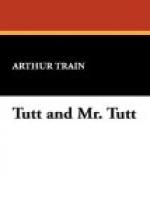He was, as Tutt put it, “a dangerous old cuss.” O’Brien was even worse. He was a bull-necked, bullet-headed, pugnosed young ruffian with beery eyes, who had an insatiable ambition and a still greater conceit, but who had devised a blundering, innocent, helpless way of conducting himself before a jury that deceived them into believing that his inexperience required their help and his disinterestedness their loyal support. Both of them were apparently fair-minded, honest public servants; both in reality were subtly disingenuous to a degree beyond ordinary comprehension, for years of practise had made them sensitive to every whimsy of emotion and taught them how to play upon the psychology of the jury as the careless zephyr softly draws its melody from the aeolian harp. In a word they were a precious pair of crooks, who for their own petty selfish ends played fast and loose with liberty, life and death.
Both of them hated Mr. Tutt, who had more than once made them ridiculous before the jury and shown them up before the Court of Appeals, and the old lawyer recognized well the fact that these two legal wolves were in revenge planning to tear him and his helpless client to pieces, having first deliberately selected him as a victim and assigned him to officiate at a ceremony which, however just so far as its consummation might be concerned, was nothing less in its conduct than judicial murder. Now they were laughing at him in their sleeves, for Mr. Tutt enjoyed the reputation of never having defended a client who had been convicted of murder, and that spotless reputation was about to be annihilated forever.
Though the defense had thirty peremptory challenges Mr. Tutt well knew that Babson would sustain the prosecutor’s objections for bias until the jury box would contain the twelve automata personally selected by O’Brien in advance from what Tutt called “the army of the gibbet.” Yet the old war horse outwardly maintained a calm and genial exterior, betraying none of the apprehension which in fact existed beneath his mask of professional composure. The court officer rapped sharply for silence.
“Are you quite ready to proceed with the case?” inquired the judge with a courtesy in which was ill concealed a leer of triumph.
“Yes, Your Honor,” responded Mr. Tutt in velvet tones.
“Call the first talesman!”
The fight was on, the professional duel between traditional enemies, in which the stake—a human life—was in truth the thing of least concern, had begun. Yet no casual observer would have suspected the actual significance of what was going on or the part that envy, malice, uncharitableness, greed, selfishness and ambition were playing in it. He would have seen merely a partially filled courtroom flooded with sunshine from high windows, an attentive and dignified judge in a black silk robe sitting upon a dais below which a white-haired clerk drew little slips of paper from a wheel and summoned jurymen to a service which outwardly bore no suggestion of a tragedy.




